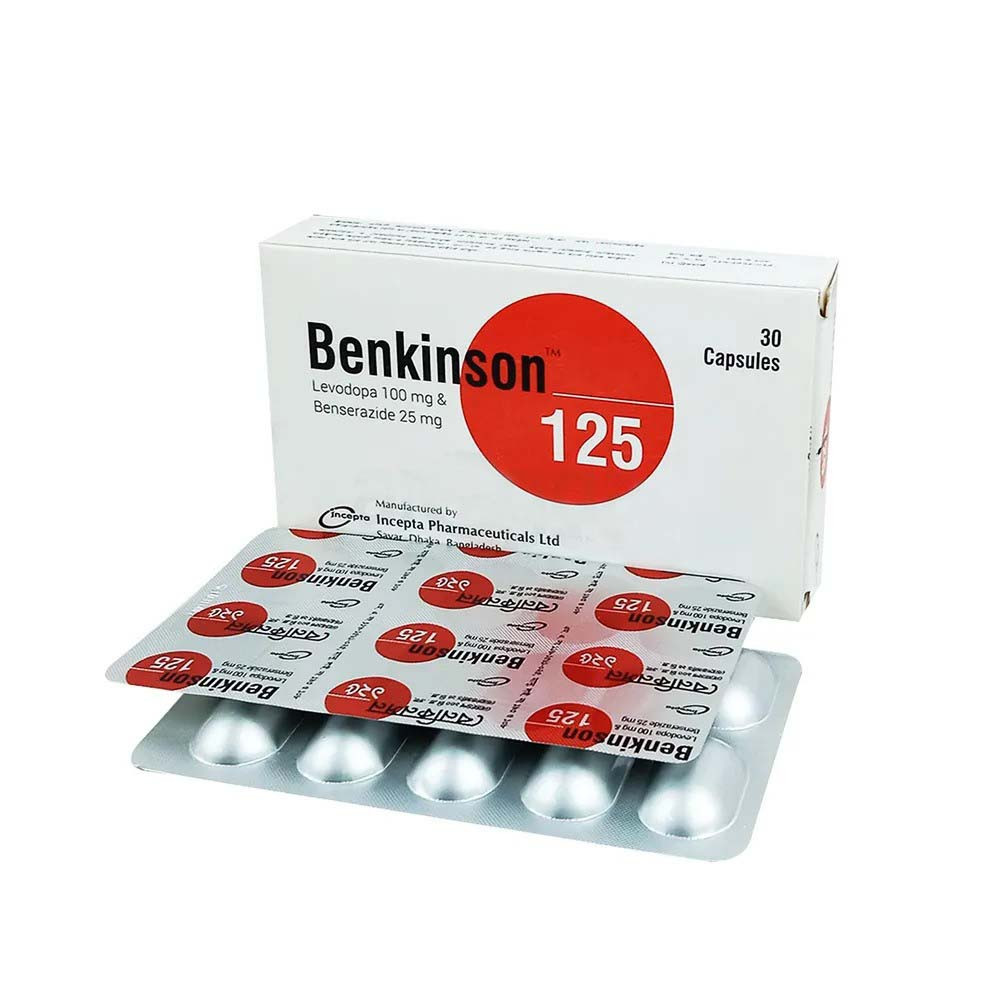Unit Price:
৳ 12.00
(3 x 10: ৳ 360.00)
Strip Price:
৳ 120.00
Also available as:
Indications
This immediate release capsule is indicated for the treatment of all forms of Parkinson's syndrome with the exception of medicine-induced Parkinsonism. On the other hand, controlled release capsule indicated for patients presenting with all types of motor fluctuations in response, especially those related to fluctuations in plasma levels (i.e. "peak dose dyskinesia" and "end of dose deterioration") and for better control of nocturnal symptoms.
Pharmacology
This capsule is an anti-Parkinson’s agent. Levodopa (dopamine precursor) is used as a prodrug to increase dopamine levels since it is able to cross the blood brain barrier whereas dopamine itself cannot. Once levodopa has entered the central nervous system, it is metabolized to dopamine by aromatic L-amino acid decarboxylase. After administration, levodopa is rapidly decarboxylases to dopamine in extra-cerebral as well as cerebral tissues. As a result, most of the levodopa administered is not available to the basal ganglia and the dopamine produced peripherally frequently causes unwanted side effects. It is therefore particularly desirable to inhibit extra-cerebral decarboxylation of levodopa. This can be achieved by simultaneous administration of levodopa-benserazide capsule, a peripheral decarboxylase inhibitor. Levodopa- benserazide capsule is a combination of these two substances in a ratio of 4:1- this ratio having proved optimal in clinical trials and therapeutic use - and is just as effective as large doses of levodopa given alone.
Dosage & Administration
For Immediate Release capsule (IR):
For Controlled Release capsule (CR):
Patients with renal impairment: No dose reduction of Levodopa-Benserazide is considered necessary in case of mild or moderate renal insufficiency.
Patients with hepatic impairment: The safety and efficacy of Levodopa-Benserazide have not been established in patients with hepatic impairment.
| Parkinson's disease | Initial dose | Maintenance | ||
|---|---|---|---|---|
| Patients not presently receiving levodopa | Early Stage | Elderly | (50+12.5) 62.5 mg, 1-2 times/day | Gradually increase by Levodopa Benserazide (50+12.5) 62.5 mg daily, in every 3-4 dauys according to response. |
| Adult | (50+12.5) 62.5 mg, 3-4 times/day | 1 capsule of Levodopa-Benserazide (100+25) 125 mg 3 to 6 times/day | ||
| Advance stage | (100+25) 125 mg, 3 times/day | |||
| Patients previously on levodopa monotherapy | Initiate with 10-15% of the usual dose previously taken | |||
| Patients previously on other levodopa/dopadecarbixylase combination therapy | Withdraw previous therapy for 12 hours before initiating therapy at Levodopa-Benserazide (50+12.5) 62.5 mg, 3 or 4 times daily | |||
For Controlled Release capsule (CR):
| Parkinson's disease with motor fluctuation | Initial dose | Maximum dose |
|---|---|---|
| Patients not presently receiving levodopa | 1 capsule of Levodopa-Benserazide (100+25) 125 mg controlled release capsule, 3 times/day | 6 capsules/day |
| Patients previously on levodopa-Benserazide immediate release preperation | Initially dose should substitute every 100 mg of Levodopa with 1 controlled-release cap, given at same dosage frequency as before. Increase every 2-3 days according to response. | |
Patients with renal impairment: No dose reduction of Levodopa-Benserazide is considered necessary in case of mild or moderate renal insufficiency.
Patients with hepatic impairment: The safety and efficacy of Levodopa-Benserazide have not been established in patients with hepatic impairment.
Interaction
Neuroleptics, opioids and antihypertensive medications containing reserpine inhibit the action of levodopa and benserazide capsule. It should not be administered concomitantly with sympathomimetic (agents such as adrenaline, noradrenaline, isoproterenolor amphetamine which stimulate the sympathetic nervous system) as levodopa may potentiate their effects. Should concomitant administration this capsule prove necessary, dose surveillance of the cardiovascular system is essential and the dose of the sympathomimetic agents may need to be reduced. Concomitant administration of antipsychotics with dopamine-receptor blocking properties, particularly D2-receptor antagonists might antagonize the antiparkinsonian effects of levodopa-benserazide capsule. This capsule should be discontinued 12-48 hours before surgical intervention requiring general anesthesia with halothane as fluctuations in blood pressure and/or arrhythmias may occur.
Contraindications
This combination is contraindicated in patients with -known hypersensitivity to levodopa-benserazide or any of the excipients, patients receiving non-selective monoamine oxidase (MAO) Inhibitors due to the risk of hypertensive crisis. However, selective MAO-B inhibitors, such as selegiline and rasagiline, or selective MAO-A inhibitors, such as moclobemide, are not contraindicated. Patients with decompensated endocrine, renal or hepatic function, cardiac disorders, psychiatric diseases with a psychotic component or dosed angle glaucoma. Because levodopa may activate a malignant melanoma, this combination should not be used in patients with suspicious, undiagnosed lesions or a history of melanoma. The management of patients with intention tremor and Huntington's chorea. Patients less than 30 years old (skeletal development must be complete).
Side Effects
Anxiety, appetite decreased, arrhythmia, depression, diarrhea, hallucination, movement disorders, nausea, postural hypotension, sleep disorders, altered taste, vomiting, leucopenia etc.
Pregnancy & Lactation
Pregnancy Category B3. This capsule is contraindicated during pregnancy and in women of childbearing potential in the absence of adequate contraception. If pregnancy occurs in a woman taking this capsule, the medicine must be discontinued. The safe use of This capsule during lactation has not been established.
Use in Children: This capsule is contraindicated in patients less than 30 years old.
Use in Children: This capsule is contraindicated in patients less than 30 years old.
Precautions & Warnings
Cushing's syndrome, diabetes mellitus, endocrine disorders, history of convulsions, history of myocardial infarction with residual arrhythmia, history of peptic ulcer, hyperthyroidism, osteomalacia, pheochromocytoma, psychiatric illness, severe cardiovascular disease, severe pulmonary disease, susceptibility to angle-closure glaucoma.
Overdose Effects
Monitor the patient’s vital signs and institute supportive measures as indicated by the patient’s clinical state. In particular patients may require symptomatic treatment for cardiovascular effects (e.g. anti-arrhythmics) or central nervous system effects (e.g. respiratory stimulants, neuroleptics). In addition, for the controlled release formulation further absorption should be prevented using an appropriate method.
Therapeutic Class
Antiparkinson drugs
Storage Conditions
Keep below 30°C temperature, away from light & moisture. Keep out of the reach of children.


